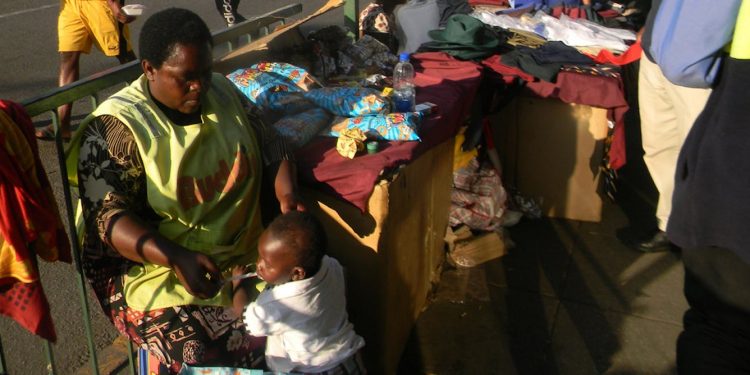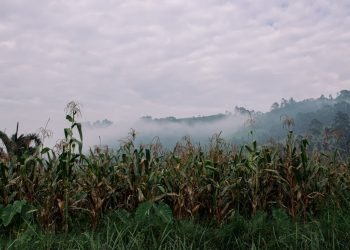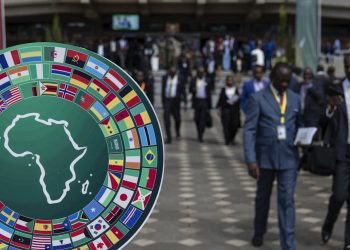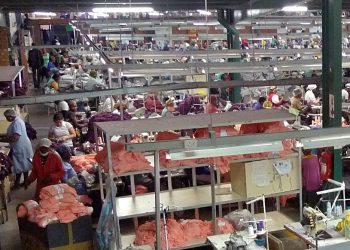The informal sector has become a dominant source of livelihoods for urban residents in African cities. Within this sector, street trading is one of the most visible and vital components of urban economies.
In Zimbabwe’s capital city, too, street traders, selling clothing, snacks, fruits and vegetables, household goods, electronics and many other products, are a dominant feature in the economy. As in most African cities, the majority of Harare’s traders operate without licences, and they are often victims of municipal raids and displacements. Yet, despite this hostile environment, street trading continues to flourish.
How do traders organise themselves in such a difficult setting? Who decides who sells where? And how is order maintained in a space where the state’s control is weak or repressive?
I am an urban geographer whose work focuses on urban informality and governance in African cities. These questions are at the heart of a study that was part of my doctoral research on urban governance and the spatial politics of street traders in Harare. I am especially interested in how the urban poor wield their individual and collective agency to challenge urban exclusion.
Drawing on interviews and focus groups with traders in Harare’s central business district, the research explores the invisible systems of informal governance that regulate access to trading spaces. The study shows that street trading is structured by its own internal rules, norms and power relations.
Informality is not the absence of order. It is a different kind of order, rooted in everyday negotiation, social trust, and the shared struggle to survive in an unequal city.
I concluded that city authorities and others should recognise that these informal governance systems are legitimate, and can even be useful when it comes to formalising activities in the city. Ignoring them could lead to conflict and deeper inequalities.
Systems of organisation
Zimbabwe’s economy as a whole has been unstable over the past four decades. As a result, the informal economy has become very important. The relationship between urban authorities and street traders has always been antagonistic, however. That conflict has been the focus of most of the research on street trading. Harare’s city officials, like those in many other African cities, often treat traders as illegal, criminal, or a threat to “modern” urban order.
My research takes a different view: I shift attention away from state repression to the everyday systems of organisation and control that traders themselves have developed.
I conducted 19 semi-structured interviews and three focus groups with traders, to learn about their individual strategies and shared social mechanisms for keeping order on the streets.
Traders in Harare use informal governance mechanisms – unwritten rules, social norms and personal relationships – to decide who can occupy which space, for how long, and under what conditions. These community-based systems are built on mutual recognition and trust, but also shaped by hierarchy, gender and seniority.
Claiming and defending space
The interviews reveal that the most important rule for maintaining order is consistency. Traders often stay in the same spot for years – sometimes decades – to build customer loyalty and to assert their informal claim.
As one vendor explained:
I stay in the same spot so that people always know where to find me … When everyone sticks to their usual place, it reduces disputes.
This practice, described by another scholar, Asef Bayat, as “quiet encroachment”, involves small, everyday acts of claiming space without formal permission. Over time, these acts become socially recognised by other traders and even by local residents or shopkeepers. If a new vendor tries to take over someone’s space, existing traders usually intervene before conflict escalates.
As one woman put it:
This peer-enforced control system maintains order but also reinforces informal hierarchies.
Leadership and street apprenticeship
Although there are no official leaders, senior traders – those with long experience or strong social influence – often act as custodians of space. They mediate disputes, mentor newcomers and enforce unspoken rules.
Shack Dwellers International, Wikimedia Commons, CC BY
New entrants typically undergo an informal “street apprenticeship”, during which they learn how to operate, when to display goods, how to evade municipal police, and whom to approach for protection. Newcomers cannot simply choose a spot and start selling. They must seek the approval of those already established. This process reflects an internalised authority system rooted in social norms rather than written law.
Social networks and inheritance
The study also uncovers how social capital – networks of trust, kinship and friendship – plays a central role in accessing space.
Many traders gain their first selling spot through relatives or friends who are already part of the informal economy. In this way, street trading becomes an intergenerational practice, often “inherited” from parents or grandparents.
One participant explained that her grandmother had traded in the same area for decades, and when she lost her formal job, she joined the family business. Others said they felt morally obliged to reserve a deceased vendor’s spot for their children or relatives.
Competition and exclusion
However, these systems are not equal or fair. Power among traders is unevenly distributed. Long-term vendors and those with strong social connections often dominate lucrative areas, while newcomers (especially young people, women and persons with disabilities) struggle to gain a foothold.
For example, male traders often control spots near busy transport hubs, which are more profitable but also riskier. Women, who are concerned about safety or need to balance caregiving duties, tend to occupy less visible areas. One visually impaired trader said he relied on others to protect his spot, showing how trust and vulnerability shape spatial access.
Read more:
Why do identical informal businesses set up side by side? It’s a survival tactic – Kenya study
There are also reports of traders using aggressive tactics to defend their territory. Some long-time vendors admitted to “chasing away” new sellers or even tipping off municipal officers to get competitors arrested. These practices reveal how informal governance can both protect livelihoods and reproduce exclusion.
Everyday politics and quiet power
My study shows that power in Harare’s informal economy is not only top-down, from the state to the traders, but also horizontal, negotiated among the traders themselves.
Those with seniority or strong networks act as gatekeepers, deciding who can sell where. Women traders often face verbal or physical harassment from male counterparts but also develop their own strategies of resistance: confronting aggressors, forming alliances, or using moral arguments about fairness to defend their right to trade. These acts of quiet defiance demonstrate that informal governance is a site of both control and agency.
Read more:
How the informal economy solves some urban challenges in a Zimbabwean town
Beyond stereotypes of chaos
What emerges from this research is a more nuanced picture of Harare’s informal economy. Street traders are not simply victims of a repressive state or chaotic actors in an unregulated market. They are also self-organising agents who build complex systems of order, reciprocity and social regulation in the absence of formal protection.
At the same time, these systems are not utopian. They involve competition, hierarchy and exclusion. Informal governance is both a survival mechanism and a structure of power.
Understanding this duality is crucial for policymakers who wish to design fairer urban policies.
![]()
Elmond Bandauko works at the University of Alberta as an Assistant Professor of Human Geography. He received funding from the Social Sciences and Humanities Research Council of Canada (SSHRC), International Development Research Centre (IDRC) and the International Journal of Urban and Research (IJURR) Foundation to conduct this research.














